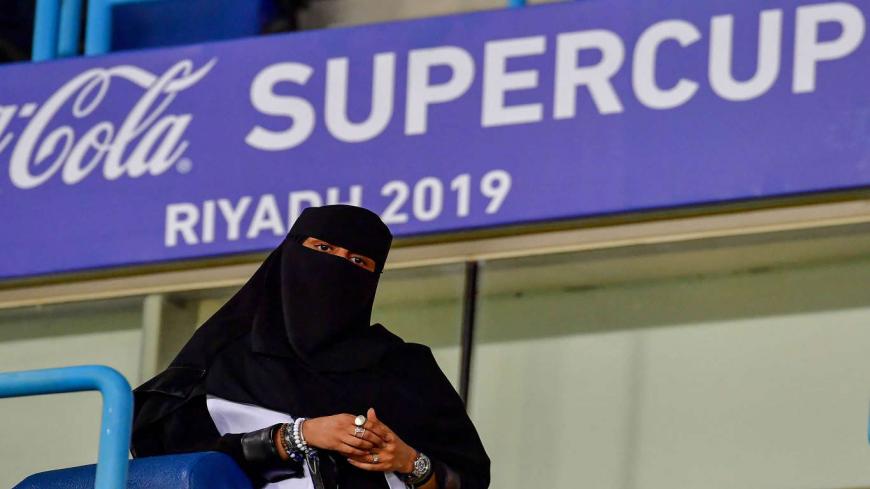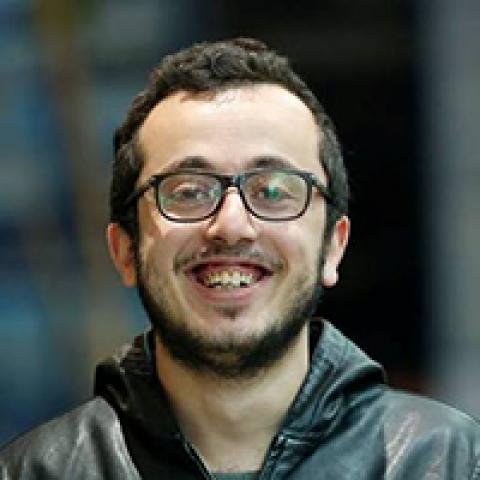Saudi Arabia’s first female soccer league is set to launch in October, after being put on hold in March due to the coronavirus pandemic. This comes two years after Saudi women were allowed for the first time into stadiums.
On Feb. 24, the Saudi Sports for All Federation (SFA) launched a female soccer league, which was postponed in March as part of the precautionary measures to stem the outbreak of the novel coronavirus.
Arrangements are underway to launch the first season of the league in the second week of October. The tournament will be reserved for women aged 17 and above. The league will play its matches in Riyadh, Jeddah and Dammam. Other cities will be added to the tournament should they have four registered teams of no less than 20 players. The registration is open until the end of September, according to the official website of the tournament, where women can register to join teams.
Saudi Arabia had previously organized a championship that included six women’s soccer teams in Jeddah, under the name of “Jeddah Women’s League” in October 2019. The games were played as per the 9 versus 9 formations, which will be applied to the upcoming tournament.
The creation of the league comes as part of the increasing support offered to women in Saudi Arabia over the past few years under King Salman bin Abdul-Aziz Al Saud and Crown Prince Mohammed bin Salman. On Jan. 12, 2018, women were allowed for the first time into stadiums in the kingdom to attend soccer matches.
Mashael al-Harbi, a player of the all-female Storm Team, which was founded at the end of 2017 and participated in the Jeddah championship, said that she has been playing soccer from a young age either in fields they rented or at their friend’s house.
“When we grow older it is no longer appropriate for young women to play soccer with young men in the streets. I used to stick with my female friends who share the same passion for soccer,” she said.
Harbi, who is one of the seven co-founders of the Storm Team, told Al-Monitor, “My parents do not have a problem with me playing soccer. The society’s view has also changed. Our coach is a married woman, and she was training us even when she was pregnant. She returned to the team after her maternity leave, and her husband is very supportive. Some less fortunate young women quit, as they did not find the support they needed from their families.”
On its official website, the SFA states that it will not provide financial support to teams to rent stadiums nor cover transportation costs. It will, however, support teams by appointing coaches and provide suitable spaces for training.
This does not seem a problem for the Storm Team.
“Our teammates pitch in to rent stadiums. We already played in three or four stadiums. The first one was a bit small. We later rented a larger field for a year so it could be exclusive for us,” Harbi, who graduated from the Arab Open University in Saudi Arabia with a degree in information technology, explained.
According to the SFA, the women’s league games will not be broadcast on TV and the tournament will be managed by female staff only. No teams are allowed to have male members onboard.
The league does not require a specific weight for the participants and players can register from across the kingdom, provided that they hold a valid resident identification card or a passport.
Azza Jawdah, Storm’s playmaker, used to train and play soccer when she visited Egypt, which does not have the same restrictions on female players as in Saudi Arabia. Then she moved with her parents to the city of Jeddah.
“Everyone used to tell me that soccer was a waste of time and that I should be focusing more on my studies. I wanted to start practicing basketball, but a friend had a women’s soccer team. I was so surprised that I did not believe her until I joined the training,” Jawdah told Al-Monitor.
“We are so fortunate to have witnessed the kingdom’s Vision 2030. Many of my friends have told me about their attempts back in 2010 and 2012 to push for the creation of a female league but to no avail. I think this generation is the first of Saudi female soccer players,” said Jawdah, who is a big fan of the Spanish professional soccer player Andres Iniesta.
Samira Faisal, Storm’s defender, faces the same stigma within her community. “Everything at the beginning is difficult to accept. But we persisted and we stuck to our ideas until society became more accepting of us,” she told Al-Monitor. “On the bright side, I did not have any problem with my family. Soccer and sports in general are in our blood; we play tennis and basketball too.”
Faisal and her sister first joined the Jeddah Eagles soccer club, before switching to Storm in January 2020, its competitor. Before that, she had been playing basketball and tennis for the past eight years.
Rahaf al-Sharif is a co-founder of the Tiger Academy for women’s soccer in Saudi Arabia, and the captain of its team. “I really do not know what to say, but the society’s view of women playing soccer at the beginning was very bad. The ugliest comments were made on social media,” she told Al-Monitor.
The Tiger Academy was founded in October 2019 by a group of young women who formed a soccer team and decided to turn it into an academy with the increasing interest in soccer, namely among women, and the launch of the Jeddah Women’s League in the same year.
Sharif, who started playing soccer at the age of eight, told Al-Monitor, “I faced many hardships to be able to form a team. There are many talents at home but they do not have the necessary expertise and the basics of playing. Many female coaches received training via the internet. This is why at first we had to hire male coaches to start somewhere, as they have more professional experience.”
SFA’s president, Prince Khaled bin Alwaleed bin Talal Al Saud, said in a televised statement back in February when he announced the women’s league that this step is a quantum leap in the kingdom and is in line with Vision 2030, aiming at empowering women and creating jobs.
“We have a training program for women to become coaches and referees,” he said.
On April 25, 2016, the Saudi government approved the kingdom’s Vision 2030 for economic and social development.








